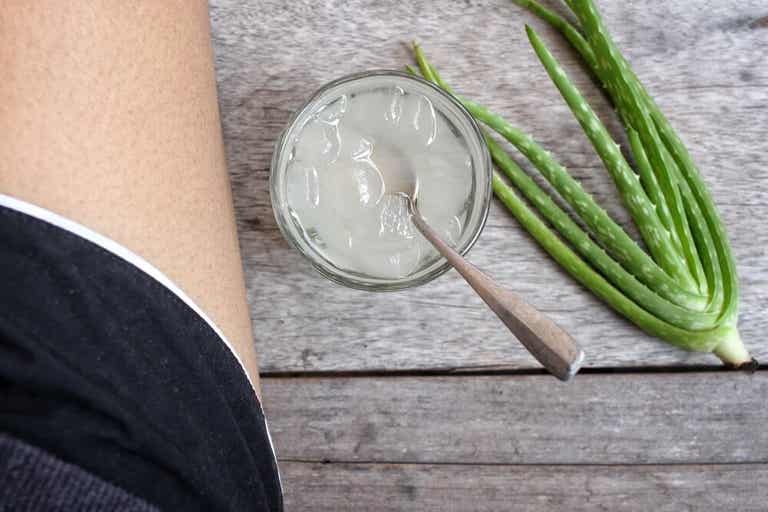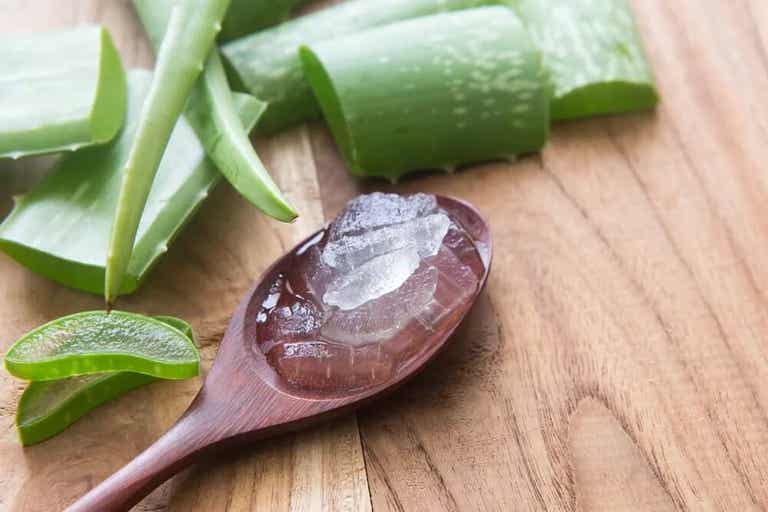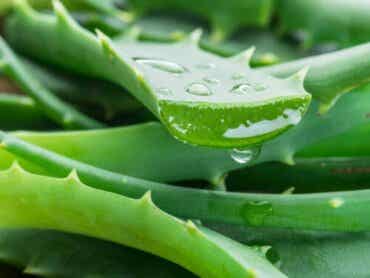알로에 베라의 건강상 이점에 관해 잘 알고 있는가? 알로에 베라는 건강, 미용, 가정에서 다양한 용도로 활용할 수 있어, 사람들이 가장 자주 찾는 식물이다. 또한 비타민 A, B군, C, E, 엽산 및 여러 미네랄을 포함하고 있어, 영양가가 풍부하다.
알로에 베라는 섭취하거나 몸에 바르면 건강에 여러모로 좋은 약용 식물이다. 지금부터 알로에 베라의 다양한 특성과 건강상 이점에 관해 알아보자.
알로에 베라의 건강상 이점은 다음과 같다.
- <Cuban Journal of Nursing> 학술지의 자료에 따르면, 알로에 베라는 진정, 치유, 보습, 재생 작용을 한다.
- 해독 및 정화 효과가 있으며, 소화에 도움이 될 수 있다.
- 군의학 상급 연구소 소속 박사인 루이스 디아즈 소토(Luis Díaz Soto)의 연구에 따르면, 항바이러스의 역할을 할 수 있다.
- 글루탐산, 아스파트산, 아르기닌, 글리신과 같은 아미노산을 포함하고 있다.
- 아밀라아제, 리파아제, 포스파타아제와 같은 효소를 제공한다.
- 멕시코 국립폴리테크닉대학에서는 알로에 베라가 식이 보조제의 역할을 한다는 연구 결과를 발표했다.
생각지도 못했던 알로에 베라의 건강상 이점 8가지

알로에 베라는 다양한 질환의 증상을 완화하는 데 도움이 된다. 지금부터 생각지도 못했던 알로에 베라의 건강상 이점을 알아보려고 한다.
물론 알로에 베라 요법을 시도하기 전에는 먼저 의사와 상담을 해야 한다. 의사의 허락을 받았다면 치료제의 대안 요법으로 활용할 수 있다.
1. 당뇨병 관리
<West China Hospital> 병원에서 수행한 연구에 따르면, 알로에 베라는 체내 포도당을 조절하는 특성이 있으며 당뇨병 완화 작용을 할 수 있다.
알로에 베라는 일부 제2형 당뇨병 환자의 포도당 수치를 낮추는 데 도움이 될 수 있다. 하지만 당뇨병 환자가 알로에 베라를 자연 치료제로 사용하려면 먼저 의사에게 문의해야 한다.
당뇨병에 대한 알로에 베라의 이점은 이게 다가 아니다. 알로에 베라를 섭취하면 콜레스테롤과 중성 지방 수치를 낮추고, 혈액 순환을 개선할 수 있다.
더 읽어보기: 제2형 당뇨병에 대한 영양상 치료
2. 소화 문제
알로에 베라는 소화를 개선하고 소화 기관의 문제를 어느 정도 완화할 수 있다. 멕시코 누에보레온자치대학의 생물과학과에서 수행한 연구에 따르면, 이 식물은 영양분 흡수를 촉진하고 소화계에 해로운 박테리아 제거에 도움이 된다.
또한 장내 세균총을 회복하며, 위궤양을 유발하는 박테리아를 공격하는 데 도움이 될 수 있다고 한다. 하지만 간에 문제가 있다면 의사에게 문의해야 하며, 섭취 시 각별히 주의해야 한다.
소화계 질환 중에서도 특히 과민 대장 증후군에 알로에 베라를 사용할 수 있다는 연구 결과가 있다. 알로에 베라를 섭취하면 부작용 없이 관련 증상을 줄이는 효과가 있는 것으로 보인다.
3. 천식
알로에 베라는 항히스타민제와 기관지 확장제의 역할을 한다. <Revista Cubana de Plantas Medicinales> 학술지에 게재된 연구 결과를 통해, 호흡기 질환의 증상을 완화하고 천식을 줄이는 데 도움이 되는 것으로 밝혀졌다.
하지만 이러한 목적으로 알로에 베라를 섭취하려면 의사와 상담을 해야 한다.
4. 화상 및 자극으로 인한 통증 완화

치유, 보습, 재생 작용을 하는 알로에 베라는 화장품, 미용, 피부 관리 분야에서 가장 높이 평가되는 식물이다.
이러한 효과는 <Iranian Journal of Medical Sciences> 학술지에서 발표한 연구와 같은 수많은 임상 실험을 통해 입증된 바가 있다.
특히 <화상 치유에 사용되는 알로에 베라의 효능: 체계적인 검토>라는 제목의 분석 연구에서는 알로에 베라가 화상으로 인한 상처 치유에 도움이 될 수 있다는 점을 발견했다. 하지만 이를 확인하려면 더 많은 연구가 필요하다.
5. 알로에 베라의 이점: 여드름 완화
소독 성분이 포함된 알로에 베라는 피부를 소독하고 각질을 제거하여, 피부를 더 건강하고 젊어 보이게 하는 효과가 있다.
<Clinical Pharmacology Advances and Applications> 학술지에서 보고한 바와 같이, 피부를 부드럽게 하고 여드름을 유발하는 균을 없앨 수 있다.
6. 체지방 감소
알로에 베라에 포함된 22가지 아미노산 중 8개는 신체에 필수적인 영양분이다. 특히 알로에 베라의 정화 작용은 신체의 특정 부위에 쌓이는 지방을 제거하는 데 도움이 될 수 있다고 한다. 그렇지만 이를 입증할 만한 증거가 충분한 것은 아니다.
또한 이 식물에는 3가지 식물성 스테롤이 포함되어 있어 혈중 지방을 줄일 수 있으며, 효과적인 항히스타민제로 작용할 수 있다.
7. 알로에 베라의 이점: 면역계 강화
일부 연구에 따르면, 알로에 베라를 섭취하면 바이러스나 질병에 대한 저항력이 높아지므로 면역계를 강화할 수 있다고 한다.
알로에 베라에는 대식 세포를 자극할 수 있는 다당류가 포함되어 있다. 백혈구라고도 하는 이러한 물질은 바이러스를 퇴치하는 역할을 한다.
8. 천연 항염증제

일부 연구 결과를 통해, 알로에 베라가 아라키돈산의 산화를 줄여 염증 수치를 낮출 수 있다는 점이 밝혀졌다. 이러한 효과를 보려면 직접 섭취하거나 환부에 바르는 것이 좋다.
자연 의학에서는 진통제 역할을 하는 알로에 베라를 타박상에 사용한다.
더 읽어보기: 항염증 효과가 있는 식품 6가지
9. 알로에 베라의 이점: 치아 건강
일부 동물 연구에 따르면, 항균 작용을 하는 알로에 베라는 치아 및 구강 질환의 치료에 도움이 될 수 있다. 그중에서도 특히 통증과 염증을 유발하는 구강 점막하 섬유증을 완화할 수 있다.
또한 구강 세정제로 활용하면 치석 제거에도 효과적일 수 있다.
알로에 베라를 안전하게 사용하는 방법
알로에 베라는 대부분 전문점에서 젤이나 즙으로 판매한다. 잎을 가르면 나오는 젤은 진득한 질감이므로, 국소적 용도로 더 자주 사용된다. 알로에 베라는 하루에 두 번 정도 피부에 직접 발라도 된다.
한편 투명하고 맑은 알로에 베라 즙은 마셔도 몸에 문제가 생기지 않는다. 적절한 섭취량과 섭취 기간만 잘 지킨다면 안전하다고 볼 수 있다.
그렇지만 알로에 라텍스나 잎 전체가 농축된 추출물은 부작용이 있으므로, 섭취하지 않는 것이 좋다.
먼저 의사와 상담을 하자
모든 자연 요법과 마찬가지로, 알로에 베라도 섭취 시 부작용이 있을 수 있다. 따라서 요법을 시작하기 전에 먼저 의사에게 문의해야 한다. 특히 임신이나 수유 중이거나 약물치료를 받고 있다면 문제가 없는지 철저하게 확인해야 한다.
지금까지 알로에 베라의 증상 완화 효과를 알아보았지만, 문제를 진단하고 몸 상태와 다른 요인에 따라 가장 적합한 치료법을 결정하는 것은 의사의 몫이다.
참고 문헌
모든 인용된 출처는 품질, 신뢰성, 관련성 및 유효성을 보장하기 위해 저희 팀이 철저히 검토했습니다. 이 글의 참고 문헌은 신뢰할 수 있으며 학문적 또는 과학적 정확성을 갖춘 것으로 간주되었습니다.
- Anuradha, A., Patil, B., Asha, V. R. (2017). Evaluations of efficacy of aloe vera in the treatment of oral submucous fibrosis – a clinical study. Journal of Oral Pathology and Medicine, 46(1), 50-55. https://pubmed.ncbi.nlm.nih.gov/27314762/
- Alinejad-Mofrad, S., Foadoddini, M., Saadatjoo, S.A., Shayesteh, M. (2015). Improvement of glucose and lipid profile status with Aloe vera in pre-diabetic subjects: a randomized controlled-trial. Journal of Diabetes and Metabolic Disorders, 14(22). https://link.springer.com/article/10.1186/s40200-015-0137-2
- Bałan, B. J., Niemcewicz, M., Kocik, J., Jung, L., Skopińska-Różewska, E., & Skopiński, P. (2014). Oral administration of Aloe vera gel, anti-microbial and anti-inflammatory herbal remedy, stimulates cell-mediated immunity and antibody production in a mouse model. Central-European journal of immunology, 39(2), 125-130. https://www.ncbi.nlm.nih.gov/pmc/articles/PMC4440021/
- Babu, S. N., Govindarajan, S., & Noor, A. (2021). Aloe vera and its two bioactive constituents in alleviation of diabetes–proteomic & mechanistic insights. Journal of Ethnopharmacology, 280, 114445. https://www.sciencedirect.com/science/article/abs/pii/S0378874121006747
- Cowan, D. (2013). Oral Aloe vera as a treatment for osteoarthritis: a summary. British Journal of Community Nursing, 15(6). https://pubmed.ncbi.nlm.nih.gov/20679979/
- Choudhary, M., Kochhar, A., & Sangha, J. (2014). Hypoglycemic and hypolipidemic effect of Aloe vera L. in non-insulin dependent diabetics. Journal of food science and technology, 51(1), 90-96. https://www.ncbi.nlm.nih.gov/pmc/articles/PMC3857397
- Españo, E., Kim, J., & Kim, J. K. (2022). Utilization of aloe compounds in combatting viral diseases. Pharmaceuticals, 15(5), 599. https://www.mdpi.com/1424-8247/15/5/599
- Hajheydari, Z., Saeedi, M., Morteza-Semnani, K., & Soltani, A. (2014). Effect of Aloe vera topical gel combined with tretinoin in treatment of mild and moderate acne vulgaris: a randomized, double-blind, prospective trial. Journal of Dermatological Treatment, 25(2), 123-129. https://www.tandfonline.com/doi/full/10.3109/09546634.2013.768328
- Hekmatpou, D., Mehrabi, F., Rahzani, K., Aminiyan, A. (2019). The Effect of Aloe Vera Clinical Trials on Prevention and Healing of Skin Wound: A Systematic Review. Iran Journal of Medicinal Science, 44(1), 1-9. https://www.ncbi.nlm.nih.gov/pmc/articles/PMC6330525/
- Keshavarzi, Z., Rezapour, T. M., Vatanchian, M., Zare Hesari, M., Nabizade Haghighi, H., Izanlu, M., Sabaghian, M., & Shahveisi, K. (2014). The effects of aqueous extract of Aloe vera leaves on the gastric acid secretion and brain and intestinal water content following acetic acid- induced gastric ulcer in male rats. Avicenna journal of phytomedicine, 4(2), 137-143. https://www.ncbi.nlm.nih.gov/pmc/articles/PMC4103709/
- Kurian, I. G., Dileep, P., Ipshita, S., Pradeep, A. R. (2018). Comparative evaluation of subgingivally-delivered 1% metformin and Aloe vera gel in the treatment of intrabony defects in chronic periodontitis patients: A randomized, controlled clinical trial. Journal of Investigative and Clinical Dentistry, 9(3). https://onlinelibrary.wiley.com/doi/10.1111/jicd.12324
- Maan, A. A., Nazir, A., Khan, M. K. I., Ahmad, T., Zia, R., Murid, M., & Abrar, M. (2018). The therapeutic properties and applications of Aloe vera: A review. Journal of Herbal Medicine, 12, 1-10. https://www.sciencedirect.com/science/article/abs/pii/S2210803318300022
- Mayo Clinic (2020). Aloe. Consultado el 29 de mayo de 2023. https://www.mayoclinic.org/drugs-supplements-aloe/art-20362267
- Mpiana, P. T., Ngbolua, K.-T.-N., Tshibangu, D. S. T., Kilembe, J. T., Gbolo, B. Z., Mwanangombo, D. T., Inkoto, C. L., Lengbiye, E. M., Mbadiko, C. M., Matondo, A., Bongo, G. N., Tshilanda, D. D. (2020). Aloe vera (L.) Burm. F. as a Potential Anti-COVID-19 Plant: A Mini-review of Its Antiviral Activity. European Journal of Medicinal Plants, 31(8), 86-93. https://journalejmp.com/index.php/EJMP/article/view/891
- Panahi, Y., Khedmat, H., Valizadegan, G., Mohtashami, R., Sahebkar, A. (2015). Efficacy and safety of Aloe vera syrup for the treatment of gastroesophageal reflux disease: a pilot randomized positive-controlled trial.
Journal of Traditional Chinese Medicine, 35(6), 632-636. https://www.sciencedirect.com/science/article/pii/S0254627215301515 - Paul, S., Modak, D., Chattaraj, S., Nandi, D., Sarkar, A., Roy, J., Chaudhuri, T. K., Bhattacharjee, S. (2021). Aloe vera gel homogenate shows anti-inflammatory activity through lysosomal membrane stabilization and downregulation of TNF-α and Cox-2 gene expressions in inflammatory arthritic animals. Future Journal of Pharmaceutical Sciences, 7(12). https://link.springer.com/article/10.1186/s43094-020-00163-6
- Reza Fallahi, H., Hamadzade, H., Mohseni Nezhad, A., Zandian, D., Taghizadeh, M. (2016). Effect of Aloe vera mouthwash on postoperative complications after impacted third molar surgery: A randomized, double-blind clinical trial. Journal of Oral and Maxillofacial Surgery, Medicine and Pathology, 28(5), 392-396. https://www.sciencedirect.com/science/article/abs/pii/S2212555816300503
- Rodríguez Rivas, M., Hernández Parets, M.,Arias Gallardo, A. I., López Guerra, R. L., Martínez Chaviano, Y. (2004). Acción antiasmática del Aloe vera en pacientes. Revista Cubana de Plantas Medicinales, 9(1). https://pesquisa.bvsalud.org/portal/resource/pt/lil-394331
- Sánchez, M., González-Burgos, E., Iglesias, I., Gómez-Serranillos, M. P. (2020). Pharmacological Update Properties of Aloe Vera and its Major Active Constituents. Molecules, 25(6), 1324. https://www.mdpi.com/1420-3049/25/6/1324
- Sujatha, G., Kumar, G. S., Muruganandan, J., & Prasad, T. S. (2014). Aloe vera in dentistry. Journal of clinical and diagnostic research : JCDR, 8(10), ZI01–ZI2. https://www.ncbi.nlm.nih.gov/pmc/articles/PMC4253296/
- Surjushe, A., Vasani, R., & Saple, D. G. (2008). Aloe vera: a short review. Indian journal of dermatology, 53(4), 163-166. https://www.ncbi.nlm.nih.gov/pmc/articles/PMC2763764/
- Tanaka, M., Misawa, E., Yamauchi, K., Abe, F., Ishizaki, C. (2015) Effects of plant sterols derived from Aloe vera gel on human dermal fibroblasts in vitro and on skin condition in Japanese women. Clinical, Cosmetic and Investigational Dermatology, 8, 95-104. https://www.tandfonline.com/doi/full/10.2147/CCID.S75441
- Yu, M., Kong, X., Chen, T., & Zou, Z. (2024). In vivo metabolism combined network pharmacology to identify anti-constipation constituents in Aloe barbadensis Mill. Journal Of Ethnopharmacology, 319, 117200. https://www.sciencedirect.com/science/article/abs/pii/S037887412301070X
- Vázquez-Fernández, P., Garayoa-Roca, A., Añón-Rodríguez, R., Cabezas-Macián, M., Serra-Desfilis, M. A., Mora-Miguel, F. (2013). Aloe vera: no siempre tan beneficioso en pacientes con hepatopatía crónica. Revista Española de Enfermedades Digestivas, 105(7), 434-435. https://scielo.isciii.es/scielo.php?script=sci_arttext&pid=S1130-01082013000700012
- Wook Hong, S., Chun, J., Park, S., Jung Lee, H., Pil Im, J., Sung Kim, J. (2018). Aloe vera is effective and safe in short-therm treatment of irritable bowel syndrome: a systematic review and meta-analysis. Journal of Neurogastroenterology and Motility, 24(4), 528-535. https://www.ncbi.nlm.nih.gov/pmc/articles/PMC6175553/
- Zhong, H., Li, X., Zhang, W., Shen, X., Lu, Y., Li, H. (2021). Efficacy of a New Non-drug Acne Therapy: Aloe Vera Gel Combined With Ultrasound and Soft Mask for the Treatment of Mild to Severe Facial Acne. Frontiers in Medicine, 8. https://www.frontiersin.org/articles/10.3389/fmed.2021.662640/full
- Drugs and Lactation Database (LactMed®). (2022). Bethesda (MD): National Institute of Child Health and Human Development. https://pubmed.ncbi.nlm.nih.gov/30000889/

